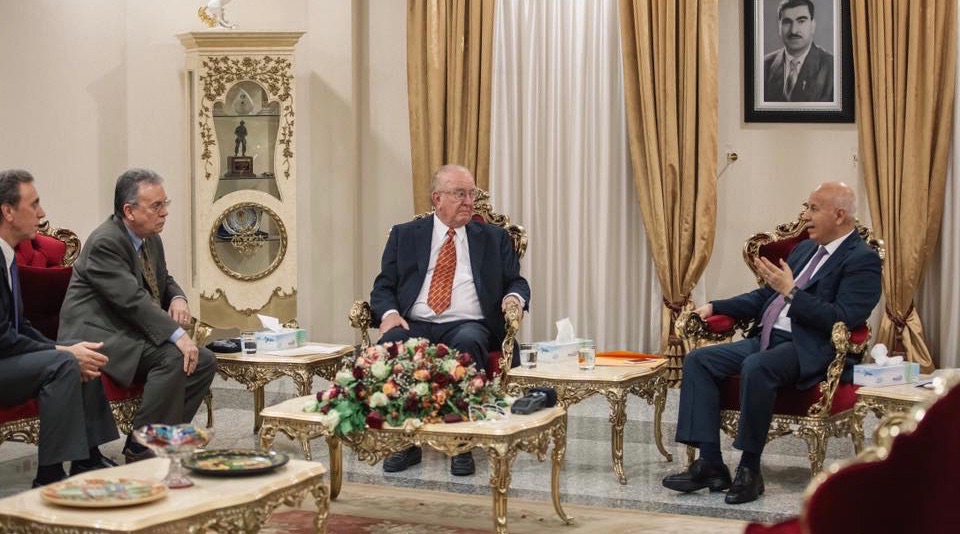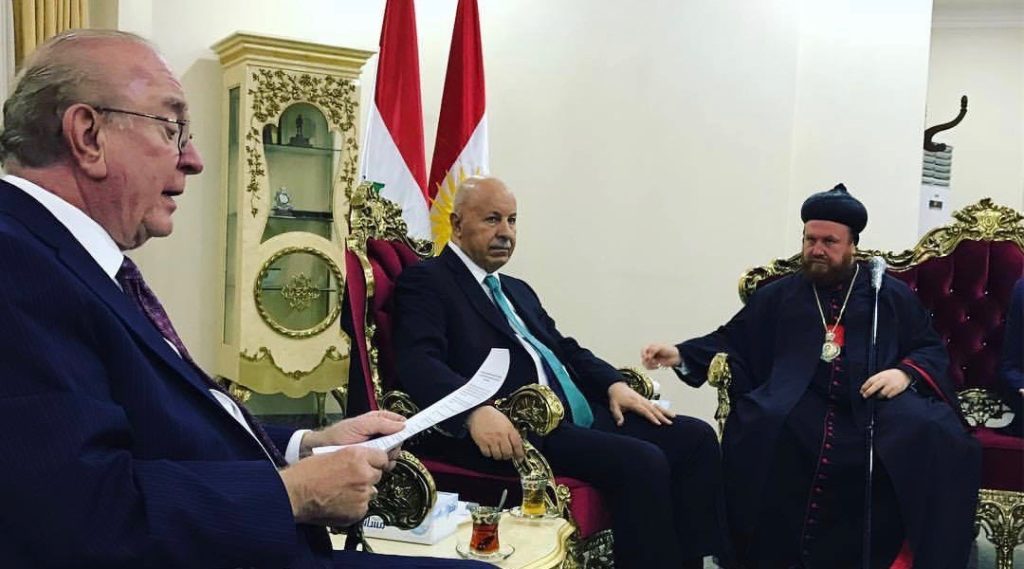Last month when Terry Law invited me to join his delegation to Kurdistan, northern Iraq, (Read Part I here.) I leapt at the opportunity. The carrot? The Kurds are preparing to declare their independence from Iraq—now Iran’s puppet—and asked for our help in guaranteeing true religious freedom for Christians and other religious minorities in their prospective new constitution. What Muslim government has ever asked Christians for help in writing a constitution? What majority Islamic nation has ever wanted to establish a true safe haven for Christians and other religious minorities? The answer, until now: Zero.

The Kurds are generally Sunni Muslims, but unlike most Sunnis they are not Arabs. “Kurd first, Sunni second,” they say. A remarkable people, they are descended from the ancient Medes, and like their famed king Cyrus (see Isaiah 45), they have historically looked kindly on Israel. Over the past hundred years, they have also been unfailingly pro-America, despite our nation’s betrayals of their trust, both after World War I and the first Gulf War.
A century ago, when the Ottoman Empire was carved up by oil-thirsty France and England and arbitrarily turned into new nations called Iraq, Saudi Arabia, et al, millions of Kurds were denied nationhood, and instead left strewn across Iran, Iraq, Syria and Turkey. Why? Because the (in)famous T.E. “Lawrence of Arabia” told his superiors that keeping the region internally fractured would prevent the reconstitution of the Ottoman Empire and hence, keep those new nations from attacking the rest of the world. Lawrence’s plan succeeded, of course, but caused justifiable Muslim rage to build for a century until Al Qaeda and ISIS erupted onto the scene, and also resulted in untold suffering for the Kurdish people. Today, 101 years after the secret, dastardly Sykes/Picot pact that denied them a homeland, 40 million Kurds remain the world’s largest people group without their own nation.
But no more, say the Kurds.
For a full century, this historic people have been told time and time again to “wait a little longer, and you’ll have your freedom.” Now, knowing that tomorrow never comes, they’re making their move, and hoping like crazy that President Trump will support them. “America’s One-Iraq Policy,” one diplomat told me, “could be shafted by a single tweet.” He’s right. One short sentence from President Trump would cause both Iran and Turkey to think twice about actively opposing a sovereign Kurdistan.
On Sunday, August 20th (the day before our near-death adventure detailed in Part I of this report) our team began interviewing the leaders of the various Christian denominations who represent Iraq’s remaining 200,000+ Christians (down from 1.6 million only a few years ago). Most of these leaders are from the Nineveh Plain, a region that adjoins Kurdistan, from Qaraqosh and Mosul to the west to the border of Turkey up north, but is not part of the Kurdish province. “Do you want your towns to be part of a new Kurdistan, or to remain part of Iraq?” we asked them, amongst several other questions.
From Syriac Orthodox to Assyrian Catholic to Presbyterian and non-denominational evangelicals, every leader said essentially the same thing: “We want to live free and as first-class citizens,” they pled, often adding in subdued tones that they know the Kurds have been their protectors and liberators and would welcome any result necessary to keep that relationship.
After four days, the interviews were finished.
“Jim, I need you to gather everyone’s notes and write the document,” said Dr. Law. “Then we’ll go over it together and also run it by [constitutional scholar] Stephen Mansfield.”
I went to work, skipping a day trip up to Dohuk in the north to write. First article:
“This Constitution shall be the supreme law of the nation of Kurdistan, not superseded or nullified by any other law.”
The constitutions of Muslim countries typically acknowledge the authority of Islamic “Sharia” law. But that provision renders any document that contains it utterly worthless, because of Sharia’s, uh, elasticity.
I kept writing, and somewhere around the fourth of what became seven articles, the curtains of my tenth-floor hotel room began to sway gently back and forth. Then, after a few seconds, I realized my iPad and mattress had joined the ballet. An earthquake? Couldn’t be, I thought. This area isn’t that active. But the swaying continued for a good 30-45 seconds. (Turned out to be a 5.6 about 35 miles away, but very deep in the earth. It was the only quake for hundreds of miles around that day.)
Dear Lord, I prayed—or laughed or both—is this document that important? Then I felt embarrassed and arrogant to have engaged in such puffery and started back to writing. But…what if?…nah.
At the appointed time, on Thursday, August 24th, our delegation walked into the gilded office of Kurdistan’s Interior Minister (aka assistant Prime Minister in most countries) and took our seats, the Minister and Dr. Terry Law front and center, the rest of us on fancy couches flanking both sides.
Pleasantries were exchanged, and then Terry presented our document—the one I had written, which listed seven articles, and which Mansfield had given a hearty thumbs up—to the Minister, while holding his own copy aloft to read.

I think I was fine until the moment Terry began reading the seven articles that I had worded to sound more like Thomas Jefferson than James Gilbert.
Dear Lord, that sounds so stark and demanding, I thought suddenly. If this referendum goes south and Iran winds up in charge, I could be a marked man. My heart was pounding as hard as it had three days earlier when that militia outside Qaraqosh were firing their guns into the air. Maybe I can pin it on Terry, I joked to myself, but it didn’t help. My heart galloped on.
Terry Law finished reading and for a moment the room fell silent.
“What is your response to these specific points, sir?” Terry asked our host. I knew they had become good friends, and I was surprised at such a blunt query. Then again, this had to be official…and quotable. Definitely, publicly quotable. Both men knew that.
The Interior Minister held the paper in front of himself and peered intently at it for a moment, before lowering it to his lap. “We will do all of this and more,” he said, breaking into a smile. Terry nodded and grinned, while the rest of us breathed out in unison, so deeply, I thought, we could have launched a small sailboat.
It was only after I’d been home for three days that a long-buried memory came flooding back to me with such force that I leaned against the shower door to keep my balance. (Yes, that’s where God often gets through to yours truly).
It was August, 1987, 30 years and a week removed from this mission, that I had received the most unusual—no, absurd—prophetic word of my life.
“I see a day coming when you’re going to be advising Muslim governments,” said a pastor named Ernest Gentile. “They’re going to need your help.”
I had never met Pastor Gentile, although all my friends spoke highly of him. And for the record, I’ve never spoken to him since. The sum total of our interaction consisted of that one minute when he stood behind me, his hands on my shoulders, and uttered those outlandish words.
Besides, I’m sort of, uh, skeptical when it comes to “words” from people I don’t really, really know and trust. There are just too many weirdos around who think that being in the Spirit means acting like you’re out of your mind. Of course, I have to admit that Pastor Gentile didn’t strike me that way. In fact, he was quiet and dignified the whole time, and today I’m grateful to him beyond words. But at that moment—it was just, just bizarre.
What Muslim government would ever ask Christians for advice? And even if they did, how would my “internationally unknown” self make the cut? Besides, this was 1987, and all any of us knew about the Islamic world was that Iran had held a group of Americans hostages for 444 days, and that there was some convoluted scandal called Iran-Contra. Why would that world ever ask for advice from the Great Satan?
Yet…here we are. The Kurds of Iraq, denied a homeland of their own for the past century, now stand on the brink of nationhood. And standing with them: the freedom and safety of not only 200,000 Christians (and perhaps as many Yazidis), but also multitudes more across the Middle East who all their lives have suffered persecution for their faith, and who would likely run to a true safe haven if one existed.
Let me turn activist for a moment. You, YOU, can do something to help establish a safe haven for Christians in the Middle East. You can write to President Donald Trump and ask him to ignore the bureaucratic path of least resistance that his advisors and State Department bureaucrats are likely to advocate, the path of betrayal that our nation has taken time and again ever since Woodrow Wilson turned a blind eye to the suffering of the Kurds a century ago.
You can write or call the White House here, and you can pass this blog along to everyone you know on Facebook, Twitter, Instagram and church.
You can join me and help a see a nation born. You, YOU, can make history.
P.S. We can only volunteer for missions like this one because someone supports our efforts. If you believe in our efforts and wish to contribute to James Gilbert Ministries, please click this link. Thank you!
